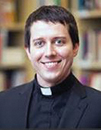By BETSY TAYLOR
Health systems pursuing a population health approach to care for their patients face ethical challenges that are distinct from those they've encountered in the past. Yet, those striving to both define and ultimately resolve these challenges can find guideposts in Catholic moral tradition.

Fr. Rozier
Fr. Michael Rozier, a Jesuit and health management and policy doctoral candidate at the University of Michigan, presented a webinar for CHA on Oct. 25 called "Preparing for the Ethics of Population Health: Our Moral Tradition Considered Anew."
People define population health differently, he said. A common definition is beneficial, so that those working on population health are able to communicate clearly about how to make such an approach work most effectively for those they serve.
Fr. Rozier asked webinar participants to think about concepts they most associate with population health, be it population health management, public health or community health. He said population health management includes the clinical strategies a health provider uses to promote health and reduce health costs among people with insurance for whom it carries some financial risk. Public health focuses on the prevention of select diseases, surveillance and policy for a geographic area. Community health is defined as health promotion activities in a geographic area.
Traditional bioethics, which is the ethics of medicine and biological research, often focuses on ethical questions that relate to an individual patient, but population health ethics involves questions that relate more to an individual within that person's social context, Fr. Rozier said. That's because population health is about more than care for individual patients.
Regardless of which population health definition an organization uses, he explained, such an approach takes into account the social determinants of health. These are the socioeconomic factors such as education, employment, social support and physical environment that can affect an individual's health and health behaviors, including diet and exercise or tobacco or alcohol use. Other factors that contribute to a person's health include access to quality health care and the safety of the person's neighborhood, he said.
Fr. Rozier said health care organizations "are continuing to be concerned about individuals in need of care." However, it is important to consider those in need of care "as individuals in their social context." For example, he said, high quality health care for a pregnant woman should not be solely defined as prenatal care, it may also mean making sure the patient has safe housing with utilities and a telephone in case of an emergency. It may mean checking to make sure the woman has supportive family she can turn to during her pregnancy and as a new mother.
Hospitals commonly serve as anchor institutions in their regions, and employees can ask about or notice what patients need and link them to resources that already exist, he explained following the webinar.
Under a population health approach, health systems may need to think more broadly about what constitutes an ethical decision. Catholic health care systems are called not just to include the poor and the uninsured as part of their communities, but to place them at their center.
Fr. Rozier outlined some of the new ethical questions that arise when considering the challenges of population health: How does a health care system define its population? To what degree should it expend resources on those who may never walk into a health care facility run by that system? Are traditional health care organizations the right organizations to build healthy communities?
Fr. Rozier pointed to a number of Christian and Jewish moral traditions that ministry members can draw from as they prepare for or encounter questions related to ethics and population health. He explained that actions that Christians perform to extend God's compassion called the Corporal Works of Mercy, including Jesus' teachings to feed the hungry and give drink to the thirsty, have applications in population health. For instance, the Works of Mercy would support giving a resident in Flint, Mich., bottled water while that person does not have access to clean drinking water. But, Fr. Rozier said, thinking about the Works of Mercy from a population health approach might also include efforts to improve the water systems in Flint, so that everyone has access to a reliable source of clean water.
Fr. Rozier spoke of the Jewish mitzvah of preserving a life. A mitzvah is a good deed done from a religious duty. He suggested that the mitzvah often has been understood as saving a life with direct intervention, such as the provision of clinical care, but the definition could include saving a life through improving social determinants of health.
He also outlined several Catholic social teachings that are relevant when making decisions about the care of populations, including a commitment to community and the common good and a commitment of one's self to others, particularly the poor and vulnerable. "A basic moral test for our society is how the most vulnerable members are faring," he said.
Copyright © 2017 by the Catholic Health Association
of the United States
For reprint permission, contact Betty Crosby or call (314) 253-3490.